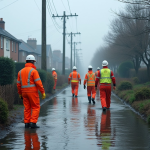
Making the climate case for local growth

This article features in issue two of Connected Places magazine.
It is hard to argue against the need to reach net zero. It’s estimated that delaying action even by one decade doubles the cost of getting there – assuming we aim to reach net zero by 2050. And, if protecting the planet and future generations isn’t enough of a reason to do it, the potential for net zero to level up towns and cities across the country should provide further impetus.
Decarbonisation is a challenge that affects transport networks, the energy grid, our use of data, how we manufacture products, and how we build buildings. These are all things that have huge impacts on communities up and down the country. If we are to achieve net zero, we need to level up and vice versa.
Levelling up is often considered to be a north versus south issue, but there are pockets of need across the entire country. As well as providing direct support to these communities, levelling up should also consider ways that we can ensure the jobs and opportunities of the future can be accessed in these areas – not just major city centres.
One challenge is that the topic of levelling up often gets attention when it’s connected with major regenerative investment projects. Net zero is the same.
“We need to see constant improvement and ongoing transformation of the parts of the country that have huge potential. And this is where net zero and levelling up meet.”
Headline-grabbing investments that the UK has made over the last decade in major renewables projects have put the UK in a leading position on reducing our reliance on fossil fuels. But, concentrated, large-scale generation accounts for only around a third of UK emissions. Major investment in generation, while news-worthy, is not enough to reach net zero.
I’d argue the same is true for levelling up. Yes, major investment and large-scale regeneration projects will help areas that need it. But there is more to it than that. We need to see constant improvement and ongoing transformation of the parts of the country that have huge potential.
And this is where the two – net zero and levelling up – meet for me.
One great example of this is in public infrastructure for electric vehicle charging points. One could argue that creating this robust public charging network should be seen as at least as important in achieving net zero as investments in renewables generation. It’s a national imperative that creates skilled jobs in engineering and ongoing maintenance that could provide opportunities for entrepreneurship, jobs and economic growth in towns and cities. Given the already apparent skills gap in green industries and the huge demand for talent, the areas of the country that can foster skills growth in sustainable STEM-related fields could accelerate their local economies too.
While job growth provides a pull, the risks of not making good on public charging provides a push too. Electric charging needs to be as accessible as putting petrol in your car. If we focus only on creating a charging network in major cities and ignore poorer communities, we again create transport issues that could hinder other initiatives that offer a chance to levelling up too.
But electric charging infrastructure is only one example. When you consider other forms of transport, our entire energy grid and how hospitals, universities, schools, offices and homes decarbonise there’s a lot of opportunity for high-skilled, high-value, local jobs.
Of course, creating a net-zero, levelled-up economy is by no means easy – and it’s not going to be cheap! But if we make sure the commercial solutions are just and fair, i.e., those with the broadest shoulders carrying their fair load, it might just be that the scale of the challenge is what is needed to provide potential for major economic growth.
Who could disagree with that?
This article features in issue two of Connected Places magazine.





